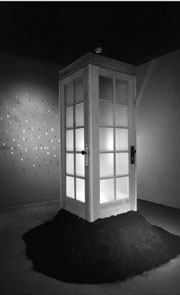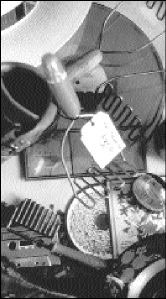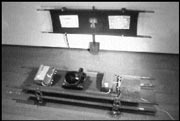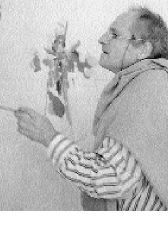EVERY WEEKDAY at 6 a.m., a line forms outside the office of Immigration and Naturalization Services on Airport Way. Stuart Keeler, a Canadian artist hoping to renew his green card, finds himself among a group of people hopeful for a chance to call this so-called land of opportunity home. But the mood isn’t all sunshine and pledges of allegiance. Curious, Keeler begins to draw people into conversation. He soon realizes that everyone in line has a deep-seated hatred for this place—Immigration and Naturalization Services—but not for the U.S.A. The idea for his installation heard said is born.
heard said
Jack Straw Media Gallery, ends May 31
Keeler’s sound-based project, a carefully engineered audio collage featuring the sighs and syntax of local resident aliens, includes voices from over 20 countries, including Greece, Thailand, Russia, Ghana, and Vietnam. Voices and languages meld into an abstract, anonymous portrait of nonnative experience.
Upon entering a small, dark room inside Jack Straw Studios, we’re met with a chorus of voices and must strain to pick out English from the cacophony. At first it’s frustrating to not understand all the languages swirling around, but Keeler insists, justifiably, that we read between the lines—that the telling factors of language are the sighs, pauses, and breaths that come between words.
Penetrating the semidarkness of the room is a continual, rhythmic mix of overlapping voices, some bright and clear, others melancholy or hesitant. Many voices chime in, fade out, circle the room, but we can only guess what they are saying. The magic is in not understanding but knowing the gist of their story: They are uprooted, nostalgic for home, but hopeful about a future in this new country. One woman is so moved by homesickness that she belts out the Indian national anthem. Another describes in a singsong northern Norwegian dialect that she arrived in America on the seventh day of the seventh month of 1977. The halting repetition comes across as a percussive linguistic game. This is the INS line encapsulated: the rattle of half a dozen native tongues at once, with a teasing word or phrase of English thrown in here and there.
IN A PARTICULARLY suggestive section of Keeler’s loop, a woman’s voice, altered by echo effect, conjugates the verb ‘to arrive’ in French. Another voice, also speaking in French, calmly says the names of African countries. Overlapped, the voices make phrases: “You have arrived in Zaire.” One is transported to a foreign train station, straining to understand announcements over the PA system. The romantic notion of travel is evoked and then abruptly deconstructed. It becomes strikingly evident that for an immigrant, this idea of arrival and departure has much more to do with survival than with leisure.
The physical installation itself is fairly basic. In the center of a darkened room at Jack Straw’s humble U District spread, there’s a rectangular chamber made of four doors and lit from within sitting atop a mound of dirt, sort of like a glowing phone booth. While the visual component is striking in its simplicity, the obvious symbolism of the closed doors and the soil (i.e. home turf) feels somewhat clumsy.
Powerfully simple, heard said forces an examination of the freedom that Americans take for granted, while both celebrating diversity and risking clich鮠On one hand, Keeler shows us our culture from the outside in, asking that we “challenge assumptions of identity and belonging,” and “witness another, caught between worlds of belonging and never really belonging.” On the other, he manages to compose an honest audio portrait of humanity without borders.








